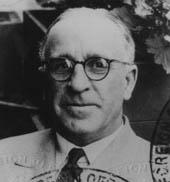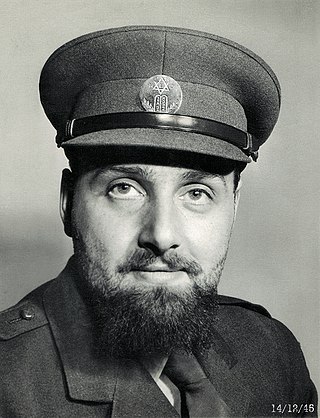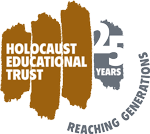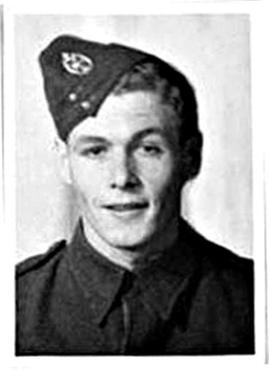Related Research Articles

The PDSA Dickin Medal was instituted in 1943 in the United Kingdom by Maria Dickin to honour the work of animals in World War II. It is a bronze medallion, bearing the words "For Gallantry" and "We Also Serve" within a laurel wreath, carried on a ribbon of striped green, dark brown, and pale blue. It is awarded to animals that have displayed "conspicuous gallantry or devotion to duty while serving or associated with any branch of the Armed Forces or Civil Defence Units". The award is commonly referred to as "the animals' Victoria Cross".

Righteous Among the Nations is an honourific used by the State of Israel to describe all of the non-Jews who, for purely altruistic reasons, risked their lives in order to save Jews from being exterminated by Nazi Germany during the Holocaust. The term originates from the concept of ger toshav, a legal term used to refer to non-Jewish observers of the Seven Laws of Noah.

Major Francis Edward Foley CMG was a British Secret Intelligence Service officer. As a passport control officer for the British Embassy in Berlin, Foley "bent the rules" and helped thousands of Jewish families escape from Nazi Germany after Kristallnacht and before the outbreak of the Second World War. He is officially recognised as a British Hero of the Holocaust and as a Righteous Among the Nations.

The British Empire Medal is a British and Commonwealth award for meritorious civil or military service worthy of recognition by the Crown. The current honour was created in 1922 to replace the original medal, which had been established in 1917 as part of the Order of the British Empire.

Sir Nicholas George Winton was a British stockbroker and humanitarian who helped to rescue Jewish children who were at risk of being murdered by Nazi Germany during the Holocaust. Born to German-Jewish parents who had immigrated to Britain at the beginning of the 20th century, Winton assisted in the rescue of 669 children, most of them Jewish, from Czechoslovakia on the eve of World War II. On a brief visit to Czechoslovakia, he helped compile a list of children needing rescue and, returning to Britain, he worked to fulfill the legal requirements of bringing the children to Britain and finding homes and sponsors for them. This operation was later known as the Czech Kindertransport.

Rabbi Solomon Schonfeld was a British Rabbi who was honoured as a British Hero of the Holocaust for saving the lives of thousands of Jews.

Albert Gustave Bedane (1893–1980) lived in Jersey during the German occupation during World War II, and provided shelter to a Jewish woman and others, preventing their capture by the Nazis.

Charles Joseph Coward, known as the "Count of Auschwitz", was a British soldier captured during the Second World War who rescued Jews from Auschwitz and claimed he had smuggled himself into the camp for one night, subsequently testifying about his experience at the IG Farben Trial at Nuremberg. He also smuggled at least several hundred Jewish prisoners out of concentration camps.

The PDSA Gold Medal is an animal bravery award that acknowledges the bravery and devotion to duty of animals. It was created by the People's Dispensary for Sick Animals (PDSA) in 2001, and is now recognised as the animal equivalent of the George Cross. The Gold Medal is considered as the civilian equivalent to PDSA's Dickin Medal for military animals. An animal can be awarded the PDSA Gold Medal if it assists in saving human or non-human life when its own life is in danger or through exceptional devotion to duty. The medal can also be awarded to animals in public service, such as police or rescue dogs, if the animal dies or suffers serious injury while carrying out its official duties in the face of armed and violent opposition.
The Victoria Cross for Australia is the highest award in the Australian honours system, superseding the British Victoria Cross for issue to Australians. The Victoria Cross for Australia is the "decoration for according recognition to persons who in the presence of the enemy, perform acts of the most conspicuous gallantry, or daring or pre-eminent acts of valour or self-sacrifice or display extreme devotion to duty."

Captain Simmon Latutin GC was a British Army officer who was posthumously awarded the George Cross, the highest British award for bravery out of combat. He won his award for the gallantry he showed in rescuing two comrades, and attempting to save a boy, from a blazing ammunition store on 29 December 1944 in Mogadishu, Somaliland.

The Holocaust Educational Trust (HET) is a British charity, based in London, whose aim is to "educate young people of every background about the Holocaust and the important lessons to be learned for today."

Denis Avey was a British veteran of the Second World War who was held as a prisoner of war at E715, a subcamp of Auschwitz. While there he saved the life of a Jewish prisoner, Ernst Lobethal, by smuggling cigarettes to him. For that he was made a British Hero of the Holocaust in 2010.
Joan Valentine Stiebel MBE was a relief worker in England, from before the Second World War. She was posthumously recognised as a British Hero of the Holocaust.

Trevor Chadwick was a British humanitarian who was involved in the Kindertransport to rescue Jews and other refugee children in Czechoslovakia in 1938–1939 before World War II. After the Munich Agreement Nazi Germany annexed Sudetenland from Czechoslovakia in 1938 and occupied the whole Czech part of Czechoslovakia in 1939. The children were mostly resettled with families in the United Kingdom.

Doreen Agnes Rosemary Julia Warriner was an English development economist and humanitarian. In October 1938, she journeyed to Czechoslovakia to assist anti-Nazi refugees fleeing the Sudetenland, recently occupied by Germany. She became the head of the British Committee for Refugees from Czechoslovakia in Prague which helped 15,000 German, Czech, and Jewish refugees escape Czechoslovakia while the country was being occupied and annexed by Nazi Germany in 1938 and 1939. Told that she would be arrested by the Germans Warriner departed Czechoslovakia on 23 April 1939. She was awarded an OBE in 1941. After the War, she was an academic at the School of Slavonic and East European Studies.
Margaret Grant Reid was a British intelligence officer and consular official in Berlin and in Norway. She received the MBE for her work during the 1940 German invasion of Norway. She was a posthumous recipient of the British Hero of the Holocaust award as, in 1938 and 1939, she had saved Jewish lives by issuing documents that permitted people to travel from Nazi Germany.
Otto Moritz Schiff CBE was a British Jewish banker and philanthropist. For his work with refugees and for public services, he successively received the OBE (1920), MBE (1924) and CBE (1939). He was posthumously recognised as a British Hero of the Holocaust.

Dorothea Weber was a Jersey person who sheltered a Jewish woman during the German occupation of the Channel Islands. She was posthumously recognised as Righteous Among the Nations and a British Hero of the Holocaust.
References
- 1 2 3 4 "Britons honoured for holocaust heroism". The Telegraph. London. 9 March 2010. Archived from the original on 12 March 2010. Retrieved 9 March 2010.
- 1 2 "Holocaust heroine honour pursued". BBC News. 24 April 2009. Archived from the original on 27 April 2009. Retrieved 9 March 2010.
- 1 2 3 "MPs seeking posthumous honours for war heroes". Birmingham Post. 26 March 2009. Retrieved 9 March 2010.
- 1 2 3 Pollock, Karen (chief executive, Holocaust Educational Trust) (31 August 2008). "Honour our brave Holocaust Scots". Letters. The Scotsman. Edinburgh. Archived from the original on 4 June 2011. Retrieved 9 March 2010.
{{cite news}}: CS1 maint: multiple names: authors list (link) - 1 2 3 Wilson, Fiona (28 April 2009). "New award for unforgotten heroes". The Times. London. Archived from the original on 5 June 2011. Retrieved 9 March 2010.
- 1 2 3 "UK-Rescuers". petitions.number10.gov.uk. Office of the Prime Minister of the United Kingdom. Archived from the original on 11 December 2009. Retrieved 9 March 2010.
- ↑ Maddox, David (14 February 2009). "MSPs support Holocaust hero campaign". The Scotsman. Edinburgh. Archived from the original on 3 September 2009. Retrieved 9 March 2010.
- ↑ "Plea for honour for woman of courage". Dumfries and Galloway Standard. 2 January 2009. Archived from the original on 9 August 2011. Retrieved 9 March 2010.
- ↑ "Award call for 'Scots Schindler'". BBC News. 29 December 2008. Archived from the original on 15 February 2009. Retrieved 9 March 2010.
- ↑ "Honour appeal for 'British Schindler'". Halesowen News. 25 June 2008. Archived from the original on 28 July 2011. Retrieved 9 March 2010.
- ↑ "Early Day Motion 1175". Early Day Motions. UK Parliament. 24 March 2009. Archived from the original on 9 March 2010. Retrieved 9 March 2010.
- 1 2 "New award for heroes of Holocaust". BBC News. 29 April 2009. Archived from the original on 3 May 2009. Retrieved 9 March 2010.
- ↑ "Gordon Brown's Announcement". Holocaust Educational Trust. 29 April 2009. Archived from the original on 9 March 2010. Retrieved 9 March 2010.
- ↑ "British Heroes of the Holocaust". Daily Hansard – Westminster Hall, Column 287WH. 29 April 2009. Archived from the original on 24 April 2010. Retrieved 9 March 2010.
- 1 2 "New award to recognise British heroes of the Holocaust". Cabinet Office Press Releases. 29 April 2009. Archived from the original on 28 January 2013. Retrieved 9 March 2010.
- 1 2 "UK-Rescuers – epetition response". petitions.number10.gov.uk. Office of the Prime Minister of the United Kingdom. 26 June 2009. Archived from the original on 7 December 2009. Retrieved 9 March 2010.
- 1 2 "British holocaust heroes recognised". DirectGov. United Kingdom Government. 9 March 2010. Archived from the original on 15 October 2012. Retrieved 9 March 2010.
- ↑ "Qualification of Award of British Hero of the Holocaust Award 2010". Whatdotheyknow.com. 19 October 2012. Retrieved 14 June 2016.
- ↑ "British Heroes of the Holocaust – Speeches". GOV.UK. 15 April 2013. Retrieved 14 June 2016.
- ↑ British Heroes of the Holocaust 2013 Full presentation ceremony. YouTube. 25 April 2013.
- ↑ "Holding on… – A blog by James Foucar". Jamesfoucar.com. Retrieved 14 June 2016.
- ↑ Little, Alison (27 March 2015). "Medals for British heroes of Holocaust: Men saved life of young Jewish girl | UK | News". Daily Express. Retrieved 14 June 2016.
- ↑ Eytan Halon (28 January 2018). "Britain honors eight Holocaust 'heroes' for saving Jewish lives". The Jerusalem Post . Retrieved 9 May 2019.
- ↑ "Britain honours its Holocaust heroes". UK Government. 23 January 2018. Retrieved 3 July 2019.
- 1 2 Heather Stewart (7 May 2019). "Theresa May backs building of Holocaust centre near parliament". The Guardian. Retrieved 8 May 2019.
- ↑ "Prime Minister leads unprecedented support for Holocaust Memorial as further £25m committed". Gov.uk. Retrieved 16 September 2023.
Lady Rose L. Henriques CBE, née Loewe, (1889-1972): Henriques was the daughter of James Loewe, a community worker and scholar in the Stoke Newington area of London. The couple worked on a number of joint enterprises together. From 1914 until 1948, they were the joint wardens of the St George's Jewish Settlement in Stepney, later known as the Bernhard Baron St George's Jewish Settlement. When the war ended, Henriques went to Germany where she worked alongside a number of Jewish welfare groups at the former Bergen-Belsen concentration camp and then at the nearby displaced persons camp.
- ↑ "Prime Minister leads unprecedented support for Holocaust Memorial as further £25m committed". Gov.uk. Retrieved 16 September 2023.
Joan Stiebel MBE (23 April 1911 – 25 January 2007): Joan Stiebel was responsible for making travel arrangements to bring 1,000 underage Jewish Nazi concentration camp orphans to the United Kingdom. The children came to be known in the press as the 'Boys', and her involvement with them continued throughout her lifetime.